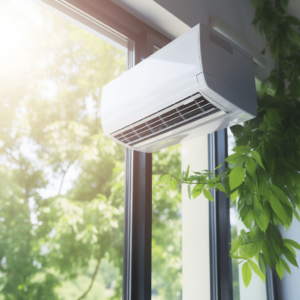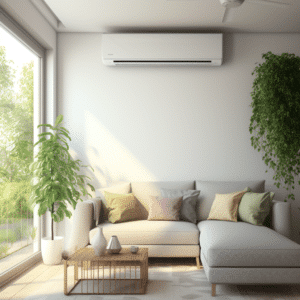Air conditioner efficiency: Tired of high energy bills in summer? Want more efficient AC and save money? Look no further! Here are tips & tricks to maximize AC efficiency and stay cool without breaking the bank.
Summer is here – so, ensure your AC runs efficiently. Clean or replace the filter regularly. This allows optimal air circulation and reduces strain on your system.
Insulate your home well. Seal gaps, cracks around windows, doors, vents. This prevents cool air escaping, hot air entering, and less work for your AC.
Using a programmable thermostat can enhance efficiency. Set different temperature levels for different times. This avoids cooling an empty house and conserves energy.
Pro Tip: Invest in window coverings like blinds or curtains. This blocks sunlight & reduces heat gain at home.
Follow these tips and enjoy comfortable living all summer. Stay cool and save money – it’s a win-win!
Table of Contents
Understanding the importance of air conditioner efficiency

The efficiency of an AC is crucial for great cooling. A higher efficiency means less energy used and less damage to the environment. Knowing its importance can help you be more comfortable and save on electricity bills.
When it comes to air conditioner efficiency, there are several factors to consider. For instance, getting the right size unit for your space is important. If it’s too big, it won’t dehumidify well, and if it’s too small, it won’t cool the area properly. Consulting with a professional can help you decide.
It’s important to do regular maintenance to keep efficiency high. Clean or replace filters to make sure there is proper airflow and to stop dust building up. Have a professional service your AC at least once a year to keep coils and fins working optimally.
Insulation helps reduce heat transfer between indoors and outdoors. This takes strain off your AC, as it stops cool air from escaping or warm air from entering. Adding insulation to walls, ceilings, and attics can help your HVAC system be more efficient.
Energy.gov says setting your thermostat at 78°F during summer days can save up to 10% on cooling costs without reducing comfort. Consider raising the temperature further when no one is home to save even more energy.
By following these strategies, you can get improved comfort, lower energy bills, and help the environment. Take action to make sure your AC is running well and remember: small changes can make a big difference in the long run!
Assessing the current efficiency of your air conditioner
It is key to assess your air conditioner’s efficiency for it to be at its best. To review its performance, take into account factors such as its age, regular maintenance, and energy consumption.
| Factors | Description |
| Age | Older units are usually not as effective. Consider replacing it if it’s over 10 years old. |
| Maintenance | Clean or exchange filters, check for leaks, and make sure insulation is good for maximum efficiency. |
| Energy Consumption | Keep track of electricity bills and compare to previous months or years. An increase could mean decreased efficiency. |
Besides these, look out for any odd sounds or reduced cooling power that may signify a drop in efficiency. It is important to address these issues quickly by getting a pro to evaluate and fix.
Pro Tip: Install a programmable thermostat to get the most out of your air conditioner. You can program different temperatures for each area of your home depending on who’s there.
Tips for improving air conditioner efficiency

Want to save energy and reduce cooling costs? Here are some tips to make your air conditioner more efficient:
- Clean or replace filters every 1-2 months. Dirty filters restrict air flow and cause ACs to work harder.
- Use a programmable thermostat. Set it higher when you’re away or asleep. Program it to cool down before you return.
- Seal air leaks. Look for leaks that let conditioned air escape. Weather-strip and seal them.
Maintain your AC unit too. Schedule regular professional maintenance to clean coils, check refrigerant levels, and run the system smoothly.
Get even better efficiency with these ideas:
- Close blinds and curtains during hot hours to reduce solar heat gain.
- Use fans with the AC to circulate the cool air.
- Buy energy-efficient AC models when upgrading or buying new.
These tips will help you optimize your AC’s performance and reduce energy consumption. They’ll also help the environment by promoting sustainable cooling practices.
Conclusion
Air conditioners are essential for keeping our homes cool and comfortable, but they can also be energy guzzlers. To maximize their efficiency and reduce energy consumption, here are some steps you can take:
- Clean or replace air filters regularly. Clogged filters reduce airflow and make the unit work harder, which consumes more energy. Also, keep the area around the outdoor unit free of debris and obstructions for better airflow and improved efficiency.
- Additionally, use ceiling fans in combination with the air conditioner. The fan helps circulate cool air throughout the room, so you can set the thermostat to a higher temperature without compromising comfort. This can save a lot of energy.
- Go for programmable thermostats too. These allow you to set different temperatures for specific times of the day. By adjusting the temperature settings based on your occupancy patterns, you can save energy and lower utility bills.
- Regular maintenance is essential for optimal performance. Get your air conditioning system inspected and serviced by a professional annually. This proactive approach not only boosts efficiency but also prolongs the unit’s life.
- In addition, buy an Energy Star certified air conditioner. These have been tested and found to meet strict energy efficiency standards set by the Environmental Protection Agency (EPA). With an Energy Star certified model, you can cool your home without harming the environment.
By following these tips, you can make your air conditioner more efficient and eco-friendly. Beat the summer heat without breaking your budget or the environment!
Frequently Asked Questions
1. How can I improve the efficiency of my air conditioner?
To improve the efficiency of your air conditioner, you can start by regularly cleaning or replacing the air filters. This helps ensure proper airflow and reduces strain on the system. Additionally, you can consider installing a programmable thermostat to optimize temperature settings and reduce unnecessary cooling.
2. Is it important to have regular maintenance for my air conditioner?
Yes, regular maintenance is essential for keeping your air conditioner operating at peak efficiency. Schedule professional maintenance at least once a year to clean the coils, check for refrigerant leaks, and ensure all components are in good working condition.
3. Should I keep my curtains or blinds closed during the day to make my AC more efficient?
Yes, keeping your curtains or blinds closed during the day can help to make your air conditioner more efficient. This prevents direct sunlight from entering your home and heating up the space, reducing the cooling load on your AC unit.
4. How can ceiling fans contribute to the efficiency of my air conditioner?
Using ceiling fans in conjunction with your air conditioner can help distribute the cooled air more efficiently throughout the room. This allows you to set your thermostat a few degrees higher without sacrificing comfort, leading to energy savings.
5. Can planting trees around my outdoor unit improve its efficiency?
Planting trees strategically around your outdoor air conditioning unit can provide shade, helping to lower the temperature of the surrounding air. This can enhance the unit’s efficiency by reducing the workload and minimizing direct exposure to sunlight.
6. What is the ideal temperature to set my air conditioner for energy efficiency?
The ideal temperature for energy efficiency is typically around 78°F (25°C). This temperature balance allows for comfort while minimizing excessive energy consumption. However, you can adjust this based on personal preference and external factors like humidity levels.